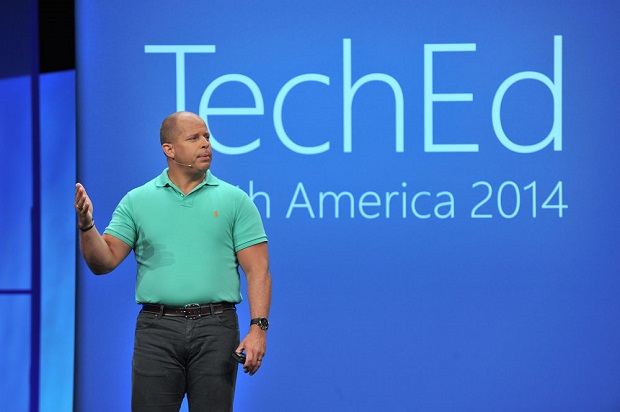Microsoft to expland software support for iOS & Android devices
Microsoft uses TechEd conference to talk up future plans to support Android and iOS users of its software

Microsoft has set out plans to expand support for Apple and Android users of its software products, in the wake of the success of Office for iPad.
The software giant used the first day of its TechEd conference in Houston, Texas, to outline the various ways its products can help business users get the most out of their Android and iOS devices.
As part of this, the company announced the preview release of its Microsoft Azure RemoteApp offering. This lets users run legacy line of business Windows apps on Android and iOS devices with the help of the firm's public cloud platform.
Speaking at the event during a Q&A session with the press, Brad Anderson, corporate vice president of Microsoft's enterprise and cloud division (pictured), claimed nearly every organisation he speaks to is struggling to deliver legacy Windows apps to the wide range of devices users have in the enterprise.
"Every single organisation I talk to has got a very large inventory of Windows applications that they are now trying to deliver down to all their users across all their devices," he said
"[This] allows organisations to upload apps and remote them down to all user devices. Every organisation has a huge inventory of apps they're trying to remote down.
"With Azure, we worry about the infrastructure and whether they can scale up or down in line with demand and they only pay for what they use."
Sign up today and you will receive a free copy of our Future Focus 2025 report - the leading guidance on AI, cybersecurity and other IT challenges as per 700+ senior executives
As a result, he claimed the amount of money end user organisations will have to spend on delivering apps across multiple platforms will be dramatically reduced.
A cloud without intelligent devices connected to it is nothing more than untapped potential.
"It's a much more simplified [process] and they can take advantage of the global presence of Azure to do that," he added.
In a similar vein, the vendor also set out how later this year it plans to bring to market functionality that will clamp down on data being accidentally and maliciously shared when Office apps are used on Android and iOS devices.
"We are going to be bringing to market a set of containers and application wrappers on iOS and Android that [will] allow you to bring your application under management and manage what happens with the data within these applications," said Anderson.
"Mobile application management allows you to protect the application and the data in that application. But we also think you need to have a tier of protection where the protection actually travels with the file."
A specific use case where this functionality could prove useful, he explained, is when individuals accidentally address emails to the wrong person.
"I can't tell you the number of times when I have received e-mails destined for [someone else]. That is accidental data leakage protection," Anderson said.
"With what we're delivering to the market, across Windows, iOS and Android, [is] if that sort of thing were to happen, it doesn't matter because the access rights, privileges, and permissions actually travel in the file. The file protects itself."
These new product developments form part of Microsoft's wider "Mobile-first, Cloud-first" push, which describes the approach it claims enterprises should take with their IT strategies in the years to come.
This was talked about at length during the opening keynote by Anderson, who said it's Microsoft's view that enterprises are becoming heavily dependent not only on cloud technologies, but mobile devices too.
"You have this intersection where mobility comes together with the cloud, where the transformational changes and the transformation innovation is going to occur. And I think right now we're just barely beginning to scratch the surface of what the possibilities are," he said.
"You really cannot have a cloud without connected devices and vice versa. In fact, if you think about it, a cloud without intelligent devices connected to it is nothing more than untapped potential.
"And as you think about the connected devices, again, without that cloud, all that you have is potential that goes untapped," he added.
-
 What the UK's new Centre for AI Measurement means for the future of the industry
What the UK's new Centre for AI Measurement means for the future of the industryNews The project, led by the National Physical Laboratory, aims to accelerate the development of secure, transparent, and trustworthy AI technologies
-
 Meta's huge capex spree shows it's struggling to keep pace with Google and OpenAI
Meta's huge capex spree shows it's struggling to keep pace with Google and OpenAINews Meta CEO Mark Zuckerberg promises new models this year "will be good" as the tech giant looks to catch up in the AI race